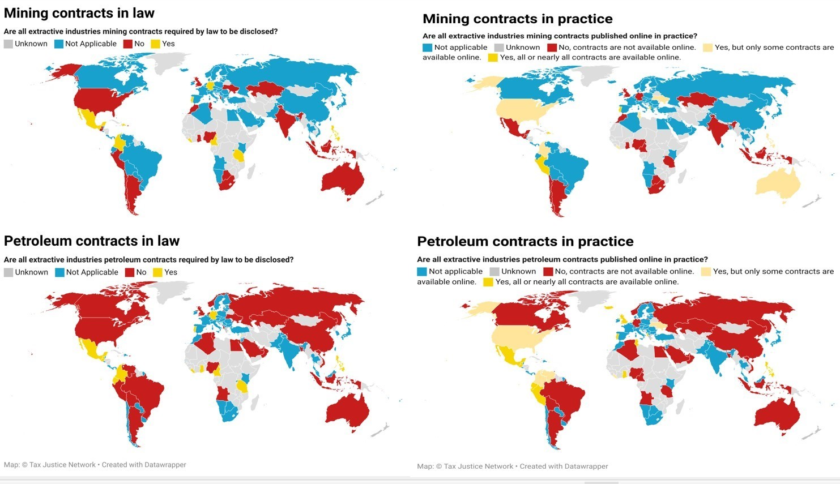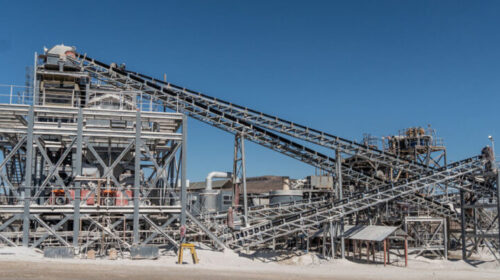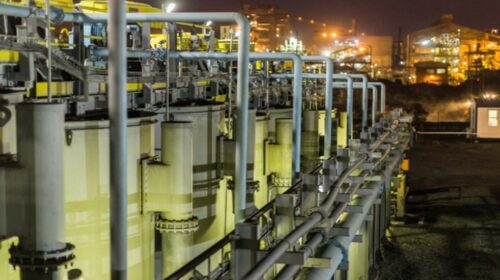Glencore and Sinosteel cases in Cameroon, practical instances of the need for more transparency on extractive contracts
(Ecofin Agency) – During the month of May 2022, Cameroon experienced a controversy over an iron mining agreement signed between its government and Sinosteel , a Chinese multinational. MPs joined by part of civil society denounced this contract and demanded its cancellation, explaining that this agreement was disadvantageous for the country. In an interview granted on May 23, 2022 to the BBC Afrique radio channel, the Cameroonian minister in charge of mines denied all the fears raised by public opinion. The government subsequently decided to publish the said convention on the official website of the Ministry of Mines, Industry and Technological Development.
On a completely different level, Glencore, the Anglo-Swiss multinational which dominates the commodity trading sector, has admitted , among several other violations, to having made payments of the order of $79.6 million, via front companies. , to obtain advantageous contracts in the oil and gas sectors, including in Cameroon.
This controversy, as well as the case of corruption of Glencore in Cameroon, reminds us that there is a need for the populations to know more about the conventions which give the right to foreign companies to exploit and carry out transactions on resources. belonging to their countries. The coffers of the state, and therefore, the citizens, always lose out due to hidden deals, weak laws and aggressive corporate tax practices. In most jurisdictions, non-renewable mineral resources are managed by the state on behalf of the people. States generally grant companies the right to explore, extract and often sell mineral resources in exchange for revenue or a share of the ore. The contract describes the rights, duties and obligations of the parties, including tax conditions and provisions. These contracts can span decades and have significant and lasting impacts.
Extractive contracts: why transparency matters
Contract transparency in the extractive sector is an essential element in the fight against illicit financial flows. In its follow-up report for the year 2022, the Initiative which is the result of a global desire for Transparency in the Extractive Industries (EITI) recalled the importance of transparency for extractive contracts. “By shedding light on the rules and terms that govern extractive projects, contract transparency can help fight corruption and empower citizens to assess whether the revenue obtained for their resources is fair. This information can be crucial in contexts where valuable revenues are impacted by market volatility and emerging energy transition policies.
It is generally accepted that the disclosure of extractive contracts means that officials and companies will be subject to increased scrutiny. This may deter introducing weak or poor fiscal conditions. It also allows governments to be compared on the quality of their negotiations with companies. Finally, disclosure allows government agencies other than the signing officer, and civil society to monitor contract performance.
The opacity of the framework in which the resources are exploited constitutes a risk of loss of income. In a report it published in 2021, the International Monetary Fund shows how the budgets of countries in Sub-Saharan Africa have come under severe strain due to efforts to manage Covid-19, while tax avoidance by multinationals mining causes them to lose sums of up to $750 million a year.
In 2021, the State of Tax Justice report published by the Tax Justice Network highlighted the fact that Africa had lost $17.1 billion mainly due to tax abuses by multinationals. For the region, in the midst of the Covid-19 crisis, this represented the equivalent of a third of public health budgets. Thus the revenue losses for African countries are the largest in proportion to the resources they need to finance their development objectives.
Publication of extractive contracts: Trends in the world and in Africa according to the Financial Secrecy Index
In its most recent edition published on May 17, 2022, the Financial Secrecy Index produced by the experts of the Tax Justice Network once again emphasizes the need for transparency in extractive contracts. Key indicator No. 9, which is used in this tool, assesses whether a country’s laws allow citizens and all interested parties to access the agreements signed between states and extractive companies, and to take freely and full knowledge of their content
To verify this, the index examines several levels of transparency on oil and mining contracts. Perhaps the most important aspect is whether a jurisdiction has enacted a law that mandates the publication without exception of all extractive contracts. The second aspect of the analysis concerns the effective publication of these contracts. Depending on whether they are fully made public and accessible or published in part and in some cases with limited or complex access, a country will receive a specific score. For information gathering and analysis, the team working on the Financial Secrecy Index within the Tax Justice Network serves as the most recent update the Natural Resources Governance Index (oil and gas), which is produced by the NGO Natural Resources Governance Institute (NRGI), and is freely accessible
Among the 141 countries analyzed by the Financial Secrecy Index, 29 countries are considered to be mining countries and this number reaches 47 for oil producing countries. Of the countries affected by mining, only 9 have adopted laws that prescribe and make mandatory the disclosure of mining contracts, including three in Africa (Cameroon, Liberia and Tanzania). In terms of oil contracts, 12 countries, including 4 in Africa (Ghana, Cameroon, Tanzania and Liberia) have laws that require the publication of contracts between the government and oil multinationals.
This trend is not very different with regard to the effective publication of said contracts. Of the 29 countries analyzed that have mining resources, only 4 publish all of their contracts, 7 do so partially, 17 do not do so at all and for 1 country this information has not been cross-checked. In oil matters, the number of countries which publish the contracts in practice is 12, and those which do so partially are 6 in number and finally, 27 do not do so at all (For 2 of the countries analyzed the information does not could not be confirmed).

Transparency of oil and mining contracts in law and in practice around the world
Source: Financial Secrecy Index 2022
In Africa, the trends are not very different. Of the 18 countries in the region assessed under the Financial Secrecy Index, 9 have oil, and only 2 (Ghana and Tunisia) publish all of their oil contracts. Liberia publishes partially and countries such as Nigeria, Angola, and Algeria, which are the three largest oil producers in the region, publish nothing at all. In the mineral resources sector, no country fully publishes its contracts. 2 countries, notably Liberia and Tunisia publish part of it and 7 African mining countries do not produce any contract.
Based on this analysis, it can be inferred that Liberia is an example of good practice in Africa with respect to the disclosure of extractive resource contracts. Although it only partially publishes its contracts, the authorities there have adopted laws requiring the publication of mining and oil contracts. Tunisia and Ghana could also have been examples of good practice. But the first does not have a specific law in this area, even if it publishes its extractive contracts. The second is a historical producer of gold in Africa but does not have a law on the disclosure of contracts in this sector, although it recently passed a law which provides for the publication of oil contracts.
Cameroon has made progress, but needs to catch up with best practices
In the case of Cameroon, it appears from the assessment made by the Financial Secrecy Index 2022, that there is a law that promotes the publication of extractive contracts. Indeed, according to article 6 of law 2018/011 of July 11, 2018 on transparency and good governance in the management of public finances, “Contracts between the administration and public or private companies, in particular operating companies resources and companies operating public service concessions are clear and made public. These principles apply both to the procedure for awarding the contract and to its content.
Despite the existence of this law, Cameroon has not been well rated in the publication of contracts. At the time the 2022 financial secrecy index was published and despite discussions with the Cameroonian authorities, there was no evidence anywhere that the country published its oil and mining contracts. In its new National Development Strategy , the authorities have nevertheless placed the extractive sector (Gas and Solid Mines), as a lever for its development, for the second part of its Vision 2035 . There is no platform freely accessible to the public, where one finds the various titles of attribution of the extractive exploitations.
Following the pressure of public opinion after the initiative of a member of parliament, the ministry in charge of mines decided to publish the mining agreement of iron ore with the Chinese state group Sinosteel. The analysis of this agreement reveals that some of its provisions are contrary to the spirit of the law on transparency and good governance in Cameroon, but also below the standards of transparency which are set by Tax Justice Network, Tax Justice Network Africa, Natural Resources Governance Institute (NRGI), the global Publish What You Pay coalition, and other civil society actors advocating for greater transparency in the sector. In article 27 of this document, it appears that certain information on the execution of the mining contract is subject to confidentiality and cannot be made public. Article 44 makes it possible to negotiate special agreements, which are not included in the Convention and which are not made public. These provisions are likely to promote the granting of advantages to the partner, to the detriment of the interests of the Cameroonian people and the populations living near the resource exploitation site. Also, secret negotiations could negatively affect the ability of the government to generate revenues consistent with the exploitation of the resource.
Transparency on extractive contracts applies in part
The issue of extractive contract transparency is an essential part of the objective of reducing tax abuses in Africa and in all developing countries. Many jurisdictions are not necessarily endowed with natural resources, but are the place of incorporation of multinationals active in the sector. We can thus cite the European Union as a whole, or even countries such as Switzerland. France and Italy, for example, are the headquarters of several major energy companies in the world, namely the Total, Areva and ENI groups, which have operations in the mining and hydrocarbons sector in Africa. Thus, the European Parliament and the Council adopted the directive on Accounting and Transparency in 2013, which obliges mining, oil and gas and logging companies above a defined size to report their payments to the respective governments of the countries where they operate. The 27 Member States have transposed this directive into their internal laws.
On June 19, 2020, the Swiss Parliament revised its Code of Obligations relating to company rights and new provisions require Swiss extractive companies active in the field of oil, gas and minerals to disclose the payments they make to governments. of the whole world. This law is aligned with the rules relating to the extractive industries already in place in Canada, the European Union, Norway and the United Kingdom. It applies to the activity of extractive companies for payments made in excess of 100,000 Swiss francs per year and has been in force since January 1 , 2021.
While important, these advances represent only a small part of the need for full transparency in extractive contracts. Mining and oil companies are also cited as supporting the Extractive Industries Transparency Initiative. The International Council of Companies in the Metallurgy and Mining sector has also made it known that all of its members are in favor of greater transparency in extractive contracts, and they align themselves for this with the implementation of the principle of the EITI going in this direction.
Transparency is necessary, but not sufficient
However, these advances remain limited in view of the objective of reducing tax abuses in the extractive industries. Already the EITI standard will only concern contracts that have been signed after 1 st January 2021. In Africa, most operating contracts sometimes date back more than 30 years. As we have seen with the index of financial secrecy, many countries are committed by adopting laws favorable to the publication of extractive contracts. But in practice, many do not publish anything at all, or only partially publish the contracts concerned. It is also noted that once the contracts are published, the other essential elements such as updates on the beneficial owners, annexes to the contracts, environmental management, financing of the operation of the project, management of the contracting and other information is not always made public.
The African Mining Vision , which has been adopted by all the countries of the continent, also places an emphasis on transparency in the extractive sector, alongside a need for profound economic structural changes, to ensure that resources serve the interests of populations. The Vision prescribes in particular , that the laws must authorize to know well the people behind the extractive multinationals as well as their projects. The conventions must also be validated by parliaments.
Thus, to promote tax transparency and combat illicit financial flows in the extractive sector:
- Countries must quickly put in place a framework that ensures greater transparency on the exploitation of extractive resources, in order to allow their tax administrations to access better information and collect more revenue. The latter as well as other control institutions should be involved in the process of awarding and implementing these agreements.
- Countries should require multinationals to report periodically on the tax planning techniques they use.
- Countries should adopt laws that ensure the availability of information on the beneficial owners of any local or foreign mining company. This information must be updated and verified using automatic data processing software.
- Countries should publish all tax expenditures related to extractive industries with clear policy objectives and assess their effectiveness.
- It is important to put in place effective systems for the taxation of capital gains made by companies on raw materials by carrying out offshore transactions. These transactions are often carried out between entities of the same group at arbitrary prices. It is also common for these multinationals to make transfers of shares abroad, which effectively conceal the acquisition of resources by a new entity.
- It is also crucial to ensure that free zones and warehouses are not exploited for uncontrolled mineral transactions. To this end, the administrations must strengthen cooperation and the exchange of information with the customs authorities to ensure that the value of the resources transiting through the port corresponds to the activities and resources declared.
- Finally, it is important that transparency on extractive contracts, goes beyond the exploitation of resources, applicable to the agreements that are signed throughout the supply chain, paying particular attention to intermediaries (subcontractors, traders , and others). The latter should be subject to transparency conditions on their contracts, and to the same tax transparency requirements and other different anti-money laundering legislation.
Source: agenceecofin.com
Translated for CKM by Arnbethnic
103 total views , 1 views today





